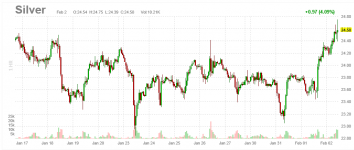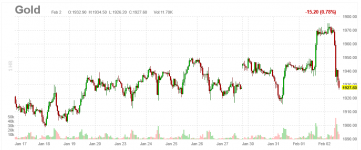Big Oil Could Get Bigger, Analyst Says. Why Trans-Atlantic Mergers Make Sense. -- Barrons.com
30 January 2023, 20:26, By Avi Salzman
Big U.S. oil companies have soared since the pandemic, hitting record highs in the stock market this month, while their peers in Europe are still far from their previous heights. Now one analyst is suggesting a dramatic way to close that gap.
Exxon Mobil (ticker: XOM)
and Chevron ( CVX)
could consider buying companies like BP ( BP)
, Shell (SHEL)
, and TotalEnergies ( TTE), wrote Citi analyst Alastair Syme. The proposal is a long shot because oil investors have been wary of large acquisitions for the past few years and have sold off stocks of companies that engage in them. But it at least serves to highlight the widening gulf between oil companies in each region. Stock in Chevron and Exxon trades at 11.2 times and 10.6 times those companies' expected 2023 earnings per share, while Shell, BP, and TotalEnergies are at 6.5, 6.5, and 5.5 times, respectively. Syme's basic point is that the European majors are now operating in a political climate that makes it harder for them to grow profitably. European countries have imposed windfall taxes on oil companies, and several pensions and other large investors there won't buy the stocks for environmental reasons. The courts have also been more strict with the companies: In 2021, a judge ordered Shell to cut its carbon emissions 45% by 2030. The European companies have pivoted more quickly to renewable energy than their U.S. counterparts, and investors tend to value those businesses at lower multiples than oil and gas production. They are skeptical that wind power and other renewables, which sell into slow-growing utility markets, will pay off as handsomely as fossil fuels. If they were swallowed by U.S. companies, the combined earnings of the companies would presumably be valued at higher multiples, Syme wrote. "Markets are unlikely to close the gap by themselves: the cost of equity of European oils remains handcuffed by investor and political headwinds, " Syme wrote. "What is really needed is for the industry to arbitrage this value itself." The U.S. companies would also be able to cut considerable costs, likely amounting to 15% to 30% of the market capitalization of the acquired company, Syme projected. Exxon, which reports earnings on Tuesday, had no comment on the report. Asked in an interview with Barron's last week about the idea of trans-Atlantic energy mergers, Chevron CFO Pierre Breber said he wouldn't comment on specific companies. But he said that Chevron has a strong recent history of making profitable acquisitions, including its purchases of Noble Energy and Renewable Energy Group over the past two years. "Any acquisition, we have to clear a high bar to make us an even better company," he said. "So of course we're always on the lookout, but we'll only act, in a disciplined way, if we think it makes our value proposition even better." A cross-ocean acquisition would shake up the energy sector even more than the megamergers between Exxon and Mobil and Chevron and Texaco that created today's oil giants 25 years ago. It isn't just the price tag that would make a deal momentous. Investors in Europe investors may not value their oil companies the way they used to, but the oil companies are still closely associated with the countries where they have operated. BP is no longer called British Petroleum, but it is undoubtedly still closely connected to Great Britain. Nonetheless, Syme doesn't expect that pride or protectionism would derail a deal, given that governments in Europe have been so critical of the oil companies that operate there. "European politicians would undoubtedly rattle their sabres, but given they have already set out an anti-oil narrative it seems unlikely they would intervene directly," Syme wrote. "Competition authorities are unlikely to put up blockers, at least not enough to remove the value-accretion potential. European managements may well argue that they are better stewards of capital, but it is tough to get the upper-hand over their US peers that have looked after investor interests well in recent years." An acquisition could change more than just oil company valuations. The U.S. majors have been wary of investing in renewables, so if they took control of a European major, they would be likely to curb spending on some of the clean-energy projects that the Europeans have been planning, Syme wrote. "We would not expect Europe's prospective capital allocation into 'low carbon' to fully survive in the hands of US peers," he wrote. That might be a win for investors who question the financial merits of the strategy, but a loss for global efforts to slow climate change.
Write to Avi Salzman at
avi.salzman@barrons.com (END) Dow Jones Newswires January 30, 2023 13:26 ET (18:26 GMT)Copyright (c) 2023 Dow Jones & Company, Inc.




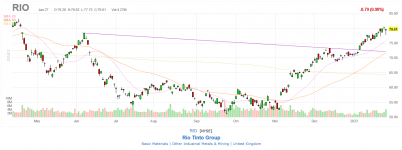
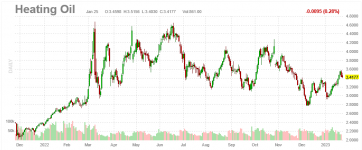
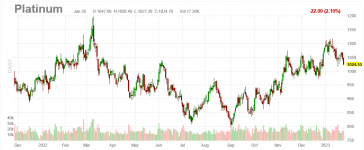

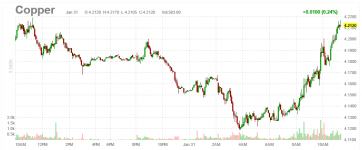
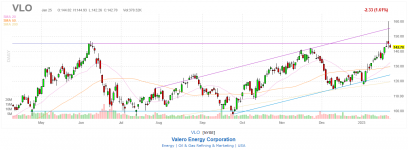
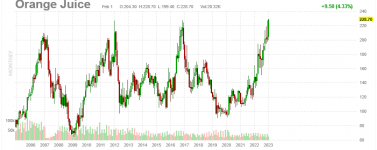
 heisse kartoffel wird aktuell ein wenig fallen gelassen.
heisse kartoffel wird aktuell ein wenig fallen gelassen. 